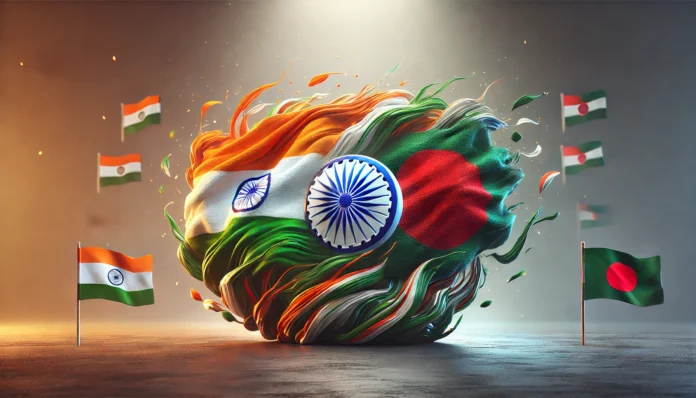India and Bangladesh share a deep historical, cultural, and geographical connection, and their relationship is generally marked by cooperation and mutual benefit. However, when pursuing its strategic interests, India can exert influence on Bangladesh through diplomatic, economic, and strategic means.
Here’s how India could apply pressure, while keeping the broader bilateral relationship in mind:
- Civic Responsibilities:
- Boycott Bangladesh: Boycott at the Bangladesh needs to be implemented per capita level at civilian side of each Indian. One should not use products sourced from Bangladesh and boycott using them from the get go.
- No more “E-Paar Bangla, O-Paar Bangla”: The notion of “E-Paar Bangla, O-Paar Bangla” (Bengal on this side, Bengal on that side) is an unrealistic and overly romanticised idea that needs to be abandoned immediately. If there had been even a shred of genuine identification with their Indian heritage, Bangladesh might have sought reintegration with India following its independence. However, the historical and ideological trajectory has shown otherwise.
- It’s East Pakistan not Bangladesh: It is crucial to remember that Bangladesh owes its very existence to the decisive intervention of the Indian Armed Forces during the 1971 Liberation War. Pakistan’s Eastern Command surrendered to India on December 16, 1971, following an effective and well-coordinated military campaign led by India. This victory not only dismantled Pakistan’s oppressive regime in East Pakistan but also paved the way for the creation of Bangladesh. However, while East Pakistan was rechristened as Bangladesh on that historic day, the ideological underpinnings of its political identity did not entirely shed the legacy of Muhammad Ali Jinnah’s vision.
Despite the cultural and linguistic differences that had fuelled their rebellion against West Pakistan, certain elements within Bangladesh retained the foundational ideology of separatism and a distinct Islamic identity that Jinnah had championed. This ideological continuity has manifested over the years in various ways, including the occasional resurgence of Islamist political movements and a guarded stance toward India. These tendencies highlight a complex national identity that is not entirely aligned with its Indian roots, despite the undeniable role India played in its liberation.
While it is important to celebrate the cultural and historical ties between India and Bangladesh, these realities underscore the need for a pragmatic approach to bilateral relations. Any expectation of ideological convergence or reunification disregards the distinct national identity that Bangladesh has carved for itself in the decades since 1971.
- Economic Leverage
- Trade Dependence: India is one of Bangladesh’s largest trading partners. India could use trade policies, such as imposing tariffs or restricting exports/imports, to exert pressure. However, this might harm both economies and provoke anti-India sentiment.
- Investment Control: Indian investments in Bangladesh, particularly in sectors like energy and infrastructure, could be slowed or reconsidered to send a message.
- Water Sharing Issues
- River Management: Shared rivers like the Ganges and Teesta are critical to Bangladesh. India could delay or alter negotiations on water-sharing agreements to leverage its upper riparian position.
- Hydropower Projects: India’s control over upstream river systems could impact water flow into Bangladesh.
- Strategic Alliances
- Engagement with Opposition: India could strengthen ties with political factions in Bangladesh that might be at odds with the ruling government. However, this is a risky strategy that could backfire and destabilize relations.
- Influence on Regional Cooperation: India could limit Bangladesh’s engagement in regional platforms like BIMSTEC or SAARC.
- Security Cooperation
- Border Management: India could increase scrutiny and restrict cross-border movement, particularly in areas where there are concerns about illegal migration, smuggling, or insurgent activity.
- Counter-Terrorism Cooperation: India might reconsider sharing intelligence or operational assistance.
- Diplomatic Pressure
- International Forums: India could use its influence in international organizations to block or delay initiatives favorable to Bangladesh.
- Public Stance: India could adopt a more assertive diplomatic stance on contentious issues like human rights, governance, or minority treatment in Bangladesh.
- Connectivity and Transit
- Restriction on Transit Routes: India has allowed Bangladesh transit access through its territory for trade with Bhutan and Nepal. Tightening or restricting such access could create economic and logistical challenges.
Balancing Act:
India must tread carefully. Any aggressive pressure could lead Bangladesh to strengthen ties with other regional powers like China or Pakistan. The fallout could harm India’s strategic and economic interests in the region.
A cooperative and conciliatory approach, backed by soft power and mutual respect, is often more effective in achieving long-term goals with neighbors like Bangladesh.

